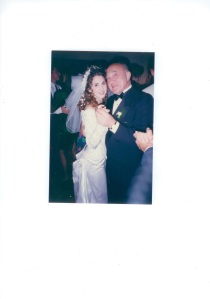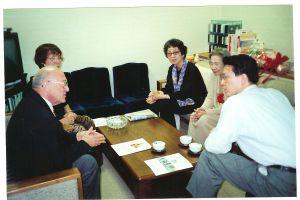I’ve had quite a bit of time on my hands lately since signing that Holy Grail of a publishing contract and waiting for said book to actually be published.

The Damsel of the Sanct Grael, by Dante Gabriel Rossetti: medieval romance. (Photo credit: Wikipedia)
Most authors who have been around this publishing block a few times dig in and write another book. Of course, if you are like me and barely know how to use the tools in your Word program, then you’ve been gobsmacked! There are a number of things you should be doing. Sitting around twiddling your thumbs waiting for your publisher to tell you what to do isn’t one of them.
Not that I ever thought that. I went into this situation with my eyes wide open. I knew the rules had changed since the early days of publishing and now a substantial amount of marketing was squarely on my shoulders. I just didn’t know where to go or how to get started and it all seemed daunting, and techie, and alien to me. So here is a brief list of things I discovered and that just might be useful to you, the burgeoning writer:
Step One: learn how your computer works.
Step Two: learn how to back up files. For some time it has been suggested opening up a drop-box account and simply shift your files there. I have been too overwhelmed with learning everything else there is to learn that I haven’t taken this step myself. . . yet. But I will! In the meantime, my computer automatically backs up to an external hard drive and I feel comfortable with that system. And yes, I hired someone to help me, just so you know before reading step three.
Step Three: if any of this is over your head hire an IT guy, or a computer fix-it guy, or gal (don’t want to presume) and let them handle it!
Step Four: set up you social media sites. This will take time, cause a headache, make you crazy and cross-eyed, but you just have to do it, so there! Not to mention all the passwords and user I.D.’s you will have to set up. Write them all down and keep them somewhere safe.
Step Five: learn how the social media sites work. Sometimes just a picture will suffice. Sometimes a sentence or two and a link (go back to Step One: learn how to work your computer) Simply cut and paste the URL and this will take readers down a rabbit hole right to where you want to lead them, hopefully. If it is any consolation I’m still learning. For example Twitter. I had no idea how to work it, I just wrote something and clicked on the tweet button. I had no idea where it went or what it all meant. You will also want to learn about ow.ly and bit.ly for Twitter. . . take my word on that.
Step Six: Start a Blog. If this proves problematic for you, don’t stress it, don’t do it. Content yourself with social media, or whatever is easiest or suits your personality. There are a lot of different ways to market yourself nowadays. Don’t limit yourself.
Step Seven: write blogs or short articles for other bloggers. Where to start? Facebook, Writer’s Literary Cafe, LinkedIn. These are all excellent places to find bloggers looking for content for their blog. The easiest is to write an author interview. In your search engine look up typical author interview questions (you supply the answers) and customize the questions for your book, your genre and your personality. This really works. I am personally grateful to all those bloggers out there who generously invited me to write for them. You can also write for news sites like examiner.com or Yahoo!Contributor Network. Click here to read my articles: April’s Yahoo! Articles.
Step Eight: if you have all this down cold, are already doing this sort of thing, then by all means write your next book!
In my opinion these steps are good to follow even if you are going down the self-published lane. It all comes down to marketing. So while you are designing your font, your front cover, your back cover, getting expert reviews, setting up your author pages on Amazon, Goodreads, Barnes & Noble (and where ever else you can dream up), and learning how to create your space, you will need to tack on some of the above-mentioned steps.
Whatever you do don’t do nothing at all. Now is the time to build your platform, make a brand for yourself, make your unique voice heard. Many authors are doing this very thing, so don’t hold back and don’t be shy. I fondly remember what my publisher said to me in an email: “You are an author now, act like it. Get out there and get some interviews done.” Then she kindly shared some helpful links. Remember you are authors. Get out there and act like it.

April signing her book publishing contract with LeRue Press for THE ALTERED I
What other suggestions do you have while waiting for your book to be published? I would love to hear about it.











